Micronations, sometimes also referred to as model countries and new country projects, are small, self-proclaimed entities that assert their sovereignty as independent states but which are not acknowledged as such by any of the recognised sovereign states, or by any supranational organization. They should not be confused with microstates, which are recognised independent states of a small size, nor should they be confused with unrecognised states, which are of more geopolitical significance because they exercise clear control of actual territory to the exclusion of widely recognized countries.
Motivations for the creation of micronations include theoretical experimentation, political protest, artistic expression, personal entertainment and the conduct of criminal activity.[1]: 4
The following is a list of notable micronations.
Current
| Flag | Foundation | Name | Description |
|---|---|---|---|
 |
2008 |
Founded as a short-term hobby,[2] Flandrensis eventually became active in raising awareness of climate change, particularly as it affects polar ice and glaciers.[3] | |
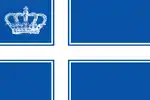 |
2001 |
Founded by Travis McHenry, Westarctica claims most of Marie Byrd Land. The micronations Melchezidek and Talossa (q.v.) also assert ownership of this area.[4] | |
 |
1865 |
Redonda is a small, uninhabitable island south-west of Antigua. According to writer M. P. Shiel, Redonda was claimed by his father, with the consent of the British Colonial Office.[1]: 108 Since 1967, the title of King of Redonda has been disputed, with multiple claimants. | |
 |
1981 |
This progressive micronation claims a minuscule amount of territory in New South Wales, but advocates for the abolition of international borders, and free migration.[5] | |
None |
1980s |
Avram does not claim any territory, and primarily exists as a micronational bank, based within Australia. The Australian government brought several lawsuits against Avram's founder, John Charlton Rudge. These finally resulted in a ruling that Rudge had committed no crimes, and his banking activities subsequently were allowed to resume.[1]: 144 | |
 |
1976 |
Alarmed by the possibility of Australia becoming a republic, a monarchist declared his farm in Bumbunga, South Australia an independent state loyal to the Crown.[6][7] | |
 |
2013 |
The Muruwari people formed this micronation in Queensland and New South Wales as part of the Australian Indigenous Sovereignty movement. | |
 |
2003 |
A family in New South Wales who were unable to afford their taxes seceded from Australia.[8] | |
| Link to file | 2004 |
During a long-running dispute with the local council over a building permit, Paul Delprat seceded from Mosman, a suburb of Sydney.[9] He did not claim to have seceded from New South Wales or Australia, however.[10] Wy is a supporter of art. | |
| Link to file[lower-alpha 1] | 2013 |
The Yidiny people, led by Murrumu Walubara Yidindji, formed this micronation in Queensland as part of the Australian Indigenous Sovereignty movement. | |
 |
1975 |
An artist built a spherical residence in Katzelsdorf, resulting in a dispute with local authorities over construction permits for it. Four years later, the artist declared his unusual structure an independent state. In 1982, it was moved to its current location in the Prater, a large park in Leopoldstadt, Vienna, where it is maintained by the city as a tourist attraction. The republic has several hundred citizens (none of whom live in the building).[1]: 82–83 | |
 |
2018 |
This crowdfunded micronation claims Coffee Caye, an uninhabited island near Belize City.[11] | |
None |
2002 |
An owner of a motel on the Blidinje Plateau seceded from Herzegovina after a jurisdictional dispute between three local municipalities, naming his micronation after hajduk Mijat Tomić.[12] | |
| Link to file | 1997 |
By referendum, the citizens of L'Anse-Saint-Jean, Quebec, chose to declare the municipality a "municipal monarchy", as a way to promote tourism.[13] | |
None |
1967 |
A Toronto neighbourhood declared itself an independent republic during the celebration of Canada's centennial on July 1, 1967.[14][15] The "Republic of Rathnelly" elected a queen and celebrates "Rathnelly Day" biennially.[16] | |
 |
1873 |
After the fall of the kingdom and death of Orélie-Antoine, the title of King of Patagonia passed between various French citizens. The current "king" is Frédéric Luz. | |
 |
2014 |
In order to draw attention to the country's lack of legal protections for glaciers, Greenpeace declared Chile's ice sheets a micronation.[17][18] | |
 |
1996 |
A BDSM resort specializing in female dominance, located in a château in Černá, Žďár nad Sázavou District, claims to be an independent matriarchy. | |
 |
1997 |
This micronation in Moravian Wallachia was founded as a joke. A leadership dispute eventually ended up in a Czech court. | |
 |
1971 |
Christiania is an intentional community and commune on the site of a former military base in Copenhagen. Known for its trade in cannabis, which is illegal in Denmark, the micronation was ranked in 2016 as the fourth most popular tourist attraction in Copenhagen.[19][20] | |
 |
1944 |
A group of schoolteachers declared the independence of Elleore, an island in a fjord of Zealand, after they had purchased it for a summer camp.[1]: 42 It is uninhabited, except during an annual gathering of the micronation's citizens. | |
 |
2010 |
The city of Aigues-Mortes named itself a principality as a publicity stunt.[21] Its claim is based on a local legend of Louis IX bestowing the title of prince on one of his squires, who was from the city. | |
 |
2015 |
Alleging that it was neglected by the national government, the commune of Laàs seceded from France.[22] | |
 |
1997 |
Brazilian law students created this "parody of the French overseas department" of Réunion, south-west of Mauritius Island.[23][24][25][26] | |
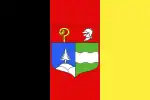 |
1947 |
While the prefect of Doubs was visiting the Saugeais, a valley in his department, a local hotel owner referred to a "Republic of Saugeais". Going along with the joke, the prefect asked for details about the non-existent nation, which the hotel owner promptly invented. The prefect responded by naming him President of the Republic of Saugeais.[27] The micronation comprises eleven communes in Doubs.[1]: 122–124 | |
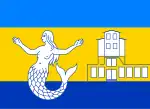 |
1971 |
A squatter in the ancient, abandoned village of Achziv slowly established a popular vacation spot. Annoyed by the encroachment of various government projects, he and his wife finally declared their haven independent. He then brought a lawsuit against the Israeli government, which resulted in the award of a 99-year lease to him,[28][29] but not full legal recognition of his micronation. Akhzivland's founder died in 2018. Although he was survived by his wife, the subsequent status of the micronation was unclear.[30] | |
 |
2011 |
Created by the mayor of Filettino in protest at the Italian government's austerity measure that reorganised the local government of towns with less than 1,000 residents.[31] | |
.svg.png.webp) |
1963 |
Citing mediaeval documents, a resident of Seborga asserted that the town had been a sovereign state since 954 AD.[1]: 55 Seborga does not claim to be exempt from Italian legal jurisdiction, however. Although the town's declaration that it is an independent nation is generally seen as a ploy to increase tourism, Seborga has been recognized by about twenty countries.[32] | |
 [lower-alpha 2] [lower-alpha 2] |
1997 |
Užupis is a neighbourhood in the Old Town of Vilnius which declared itself a republic. The dilapidated area long has been favoured by artists. The micronation has an eccentric constitution, and has appointed ambassadors not only to countries, but also to other neighbourhoods and cities, historical locations that no longer exist, and even concepts.[33][34] | |
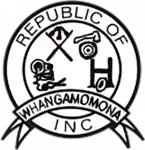 [lower-alpha 3] [lower-alpha 3] |
1989 |
Residents of Whangamōmona objected to the regional placement of their township after a restructuring of local government, and declared Whangamōmona a republic. | |
 |
1991 and 2000 |
Eleven days after the secession of Macedonia (now named North Macedonia) from Yugoslavia, residents of the village of Vevčani almost unanimously voted, in turn, to become independent from Macedonia. The Macedonian government later allowed Vevčani to separate from Struga Municipality, and become a municipality of its own.[35][36] | |
 |
1877 |
This micronation, also known as the Kingdom of Humanity, claims the Spratly Islands, an archipelago in the South China Sea which is the subject of a territorial dispute between several recognized countries as well.[37][38] | |
 |
2006 |
Nami Island is home to the Naminara Republic, a self-declared micronation described as "a tourist destination that advocates the concept of a nation."[39] On 20 July 2018, a retired M48 Patton tank was received from the Republic of Korea Armed Forces.[40] | |
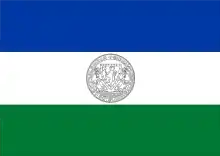 |
1963 |
The republics (Republic of Jämtland for short) base their claim of independence upon Jämtland's autonomy prior to 1178. Their objective is to promote Jämtlandic culture. | |
 |
1996 |
Lars Vilks created two sculptures in the Kullaberg nature reserve. When the art was discovered, the local council ruled that it should be removed, resulting in a legal battle. After he lost in court, Vilks declared an area around his sculptures independent. | |
 |
2008 |
Stuart "Captain Calamity" Hill squatted on Forewick Holm in Shetland. He declared it to be a Crown Dependency, claiming that Shetland had not been legally integrated into the United Kingdom after Christian I of Denmark pawned it to James III of Scotland in 1469.[41] | |
 |
1276 and 1947 |
Llywelyn ap Gruffudd, Prince of Wales, declared the town of Llanrwst a "free borough", and not part of the Diocese of Llanelwy. This royal privilege was successfully defended against reversal by the Catholic Church for some decades. | |
 |
1967 |
Paddy Roy Bates took over HM Fort Roughs, a defunct Maunsell Fort built off the coast of Suffolk during World War II, and declared it an independent country. At the time, the fort was international waters. In 1978, Germany sent a diplomat to Sealand to negotiate with Bates for the release of a German citizen who claimed to be Sealand's prime minister, and had led a failed attack on the fort. Bates would thereafter claim that the dispatching of the emissary constituted recognition of Sealand by Germany. The purported prime minister set up a Sealand government in exile after being repatriated to Germany. In 1987, the United Kingdom extended its territorial waters, which now encompass Sealand.[1]: 8–13 | |
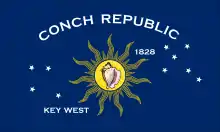 |
1982 |
Frustrated by a United States Border Patrol checkpoint on the only road into Key West, Florida, the city's leaders, including mayor Dennis Wardlow, humorously declared Key West independent.[1]: 130 The republic later expanded its territorial claims to include a nearby area on the Florida mainland. | |
None |
1998 |
When Eastport temporarily was cut off from the rest of Annapolis, Maryland, by maintenance on a drawbridge, a group of residents of the neighbourhood declared it independent, as a way to promote business.[42][43] | |
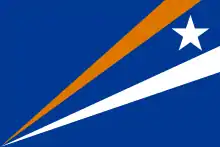 |
1994 |
Mainly known as a front for financial fraud,[44] this micronation claims as its territory Wake Island, a remote atoll in the Pacific Ocean that is a United States insular area, but is also claimed by the Marshall Islands.[45] EnenKio has ties to Melchezidek (q.v.), another micronation. | |
None |
1974 |
A group of Native Americans of the Mohawk tribe occupied an area near Moss Lake, in New York State, claiming it to be part of a far larger territory that had been illegally acquired from indigenous Americans in 1797.[46] After years of negotiations with the state, the group agreed to move to an area near Altona. Issues of sovereignty remain unresolved.[47][48] | |
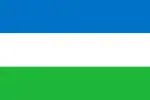 |
1977 |
This micronation existed only as a concept until its founder bought land in Nevada in 1998.[49] | |
None |
c.1965 |
This republic, retroactively dated to 1636, encompasses the Theater District in the borough of Manhattan, in New York City. In the late 1970s, a dispute between Montmartre's founder and New York Telephone, over whether the micronation could be listed in the government pages of the phone book, ended up in front of the New York Public Service Commission. The commission vacillated, alternately issuing rulings in favour of each party, and listings for the republic did appear in at least a few editions of the New York Telephone book. | |
 |
2021 |
A micronation in Imperial County, Southern California that was founded by slow jam DJ Randy Williams. It claims an empty, 11-acre plot of desert land along the California State Route 78 that Williams purchased for $19,000.[50][51] | |
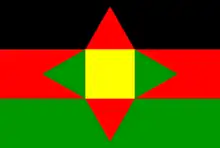 |
1990s |
The Washitaw Nation is an African American group that defines itself ethnically, rather than by territory, akin to a Native American tribe. It is associated with the Moorish Science Temple of America, a religious sect. It is also considered part of the sovereign citizen movement, a category of people, primarily in the United States, who believe that various forms of government authority are illegitimate. | |
 |
2005 |
This micronation claims a small area in Utah.[52] | |
 |
1878 |
This social organization declared itself an independent country. A residence in the Punta Carretas neighbourhood of Montevideo, and the plot of land on which the building sits, constitute the micronation's territory. | |
Other | |||
 |
1992 |
This conceptual art project was created by Carl Michael von Hausswolff and Leif Elggren. The micronation claims international borders as its territory, as well as other "interstitial territories" such as Limbo, and counts all dead persons as its citizens. In 2007, Elgaland-Vargaland claimed to have annexed Isola di San Michele, in the Venetian Lagoon. | |
 |
2015 |
Vít Jedlička founded this micronation, which claims part of the land on the disputed border of Serbia and Croatia. Access to the area asserted to be Liberland is mostly controlled by Croatia. YouTube host Niko Omilana visited the land in April 2023.[53] There are approximately 20 Liberland citzens on the territory as of August 2023.[54] | |
Global states or no territory | |||
 |
2016 |
Igor Ashurbeyli founded Asgardia, which has the objective of creating a colony in orbit that is an independent country. Under the Outer Space Treaty, no nation may lay claim to territory in space. A number of smaller countries are not parties to this treaty, however. Asgardia launched a small satellite in 2017, and claimed the space occupied by it as the micronation's territory.[55] The satellite re-entered the atmosphere and burnt up in 2022,[56] as was expected. | |
 |
2008 |
Austenasia purports to be a successor to the Roman Empire. It was founded in a house, which now serves as the micronation's capital, in Sutton, a borough of Greater London, United Kingdom. Austenasia's claimed territory has been extended to other small properties around the world as new citizens have joined the micronation.[57] | |
| Link to file | 2000 |
Maharishi Mahesh Yogi, the founder of Transcendental Meditation, established this "country without borders for peace-loving people everywhere."[58] It has made several unsuccessful attempts to create sovereign territory in recognized countries by offering financial compensation to their governments or to local residents. The micronation's currency has gained some limited acceptance. As of 2023, the GCWP is led by Tony Nader.[59] | |
 |
1990 |
This source of financial fraud[60] claims several Pacific islands, as well as a portion of Antarctica that has not been claimed by any recognized country, comprising most of Marie Byrd Land. (Two other micronations, Talossa and Westarctica, q.v., have also asserted control of this area in the Antarctic.) Melchezidek has been recognized by the Central African Republic. | |
 |
1998 |
Nova Roma is an organization that seeks to recreate a "classical Roman" society. It subscribes to ancient Roman religion, holds competitions and re-enactments, and mints its own coinage. It is considered by some to be a micronation.[61][62][63][64][65] | |
 |
1973 |
John Lennon and Yoko Ono founded this "conceptual country", partly as a satirical response to the United States government's attempt to deport Lennon. Nutopia "has no land ... only people", and anyone may declare himself a citizen.[66][67] | |
 |
1979 |
An American teenager in Milwaukee, Wisconsin, created this micronation, the territory of which was initially limited to his bedroom. It has since expanded into part of Milwaukee, as well as other locations on Earth (including Marie Byrd Land, which is also claimed by two other micronations, Melchezidek and Westarctica; q.v.). Talossa's founder claims to have invented the term micronation as well.[1]: 101 Although Talossa was disestablished by its founder in 2005, it nevertheless continues to exist, due to the continued efforts of its citizens.[68] The micronation is notable for having its own invented language, which has an extensive vocabulary. | |
Former
| Flag | Years of existence | Name | Description |
|---|---|---|---|
 |
1978-1996 |
The founder of Aeterna Lucia, who claimed to have been made a baron by an exiled king of Afghanistan, declared his property in New South Wales a sovereign country. He moved twice within New South Wales, taking his micronation with him. He was charged with fraud in 1990, but the case was eventually dropped.[69] | |
 |
2004-2017 |
In protest of the national government's refusal to recognize same-sex marriages performed elsewhere in the world, a group of gay rights activists declared the Coral Sea Islands independent. The micronation counted all gay and lesbian people worldwide as permanent residents and eligible for citizenship. In 2017, the Australian government agreed to legalize same-sex marriage if a majority of voters responding to an official survey supported it. The results were in favour of legalization. Its objective having been achieved, the kingdom was dissolved. | |
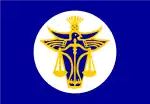 |
1970-2020 |
During a dispute with the Western Australia government over its limits on wheat production, Leonard Casley declared his sizable farm an independent province, though he remained loyal to Queen Elizabeth II.[1]: 22 The micronation persisted for decades. Casley's son and heir, Graeme Casley, contending with a massive debt to the Australian Taxation Office as well as the impact of the COVID-19 pandemic, finally dissolved the principality.[70][71] | |
 [lower-alpha 4] [lower-alpha 4]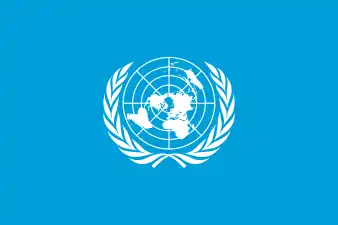 |
1993-1993 |
Facing repossession of two properties near Marlborough, Queensland, that he owned, the founder of this micronation declared them an independent country. Although he had about 30 supporters, he and his family were forcibly evicted by police eleven days later.[72] | |
| Link to file | 1979-mid–1980s |
At least thirty farmers were engaged in a dispute with the government of Victoria over flood damage to their farms, and taxes. One was inspired by the Hutt River Province (later the Principality of Hutt River, q.v.) to secede from Victoria. Like Hutt River, Rainbow Creek retained its loyalty to the Crown.[1]: 145 | |
 |
1893-1895 |
James Harden-Hickey claimed the uninhabited southern Atlantic island of Trindade, which did not belong to any nation. Two years later, the United Kingdom declared that the island was its territory, ignoring Harden-Hickey's claim. The British annexation of Trindade was disputed by Brazil, which ultimately would take possession of the island. | |
 |
1949-1973 |
The owner of one of the Tusket Islands in Nova Scotia established this micronation centred around recreational fishing.[73] | |
 |
2005-2018 |
A television news cameraman founded Vikesland in order to make a documentary about it and other micronations. It claimed his residence in Brandon, Manitoba, as well as a nearby property that he owned jointly, as its territory.[1]: 90–93 | |
None |
1992-2010 |
As part of his television chat show Nightmare Stage, Željko Malnar declared an independent republic, located in Stara Peščenica, a neighbourhood of Zagreb. | |
None |
1990-1993 |
This micronation existed in Dresden.[74] | |
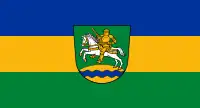 |
1989-1989 |
This village declared itself independent. One day later, the Berlin Wall fell, and Rüterberg became part of a reunified Germany. | |
None |
1980-1980 |
At a site that was planned to be tested for suitability for storing radioactive waste, about 5,000 activists established a protest camp and set up a micronation. They were forcibly evicted 32 days later. | |
 |
2018-2020 |
The co-founder of the Keraton claimed that an agreement 500 years earlier between the Majapahit Empire and the Portuguese Empire gave him dominion over the entire Earth. He would later admit that the micronation was a fraudulent enterprise. | |
 |
2003-2020 |
The founder of the Sunda Empire claimed to be the successor of Alexander the Great,[75] ruling over a swath of territory extending from Australia to South Korea. He and two other leaders of the micronation were arrested and imprisoned in Indonesia for disseminating false information.[76] | |
 |
1968-1969 |
A platform was built just outside of Italian waters for the purpose of creating this micronation. The republic did not sit well with the Italian government, which quickly seized and destroyed the platform.[1][77] | |
None |
2008-2009 |
Sardinian separatists took over the island of Mal di Ventre, off the coast of Sardinia, and declared it independent.[78] | |
.svg.png.webp) |
1964-1966 |
Ernest Hemingway's brother Leicester established this micronation on a raft anchored off the coast of Jamaica, with the objectives of conducting a democratic experiment and researching marine life. He claimed that the barge qualified as an island under the Guano Islands Act, and he designated half of it United States territory. He lived on the raft for a time with his family and two staff, and planned to build an artificial island on the site, but the barge was destroyed during a storm.[79][80] | |
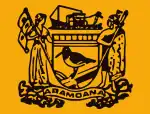 |
1980–1981 |
A small New Zealand community that declared itself independent to protest the building of an aluminium smelter on nearby land.[81] | |
None |
1970-1977 |
In protest of Nigeria's military dictatorship, musician and activist Fela Kuti declared his property in Lagos independent. Kalakuta contained the residences of Kuti's family and band members, and his recording studio. The compound was attacked and destroyed by the Nigerian military several years later. | |
| Link to file | 1956-1974 |
The founder of Freedomland claimed dominion over the Spratly Islands.[82] He eventually signed them over to the Philippines.[83] | |
 |
1959-1980 |
In what was then Tanganyika, the founder of this micronation declared his property independent, and proclaimed himself sultan.[84][85] | |
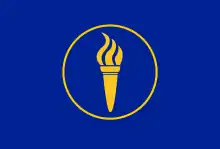 |
1972-1982 |
In its first bid to establish a libertarian state, the Phoenix Foundation began building an artificial island on the Minerva Reefs. This alarmed countries in the vicinity, which mutually agreed that Tonga would claim the atolls. A decade later, the leader of the Republic of Minerva made a second unsuccessful attempt to take possession of the reefs.[1]: 14 | |
 |
1811-1816 |
Jonathan Lambert occupied, renamed, and declared himself ruler of the remote archipelago Tristan da Cunha, in the southern Atlantic. He and two of the other three inhabitants of the largest island drowned five months later, but the surviving resident and two men who joined him continued to live there. The United Kingdom annexed Tristan da Cunha several years later, to pre-empt its use by France or the United States.[86][87] | |
 |
1977-1980s |
In the London borough of Hammersmith, a community of squatters, which counted some prominent writers, musicians, and other artists among its members, was facing eviction. Inspired partly by the micronation Freetown Christiania (q.v.), the residents voted to secede. In a dispute over the performance of a play, a British court ruled that, for the purposes of that particular lawsuit, Frestonia was not part of the United Kingdom. | |
 |
2004-2013 |
In the television series How to Start Your Own Country, Danny Wallace investigates the subject of micronations, and starts one of his own. Lovely claimed Wallace's East London flat as its territory. | |
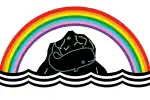 |
1997 |
Greenpeace took the island of Rockall in protest against the oil research activities organized under British rule. On June 15, the island was declared independent as the "Global State of Waveland". The occupation will last 42 days in total. | |
 |
1997-2004 |
A group of college students envisioned a libertarian state, but were never able to acquire territory other than the leader's home in Boston, Massachusetts.[88] | |
.svg.png.webp) |
1861-1986 |
Tennessee was the last state to join the Confederacy before the American Civil War. The state's secession was unpopular in much of East Tennessee, including Scott County. Shortly after the war began, residents overwhelmingly voted to declare the county independent of Tennessee, and it became a Southern Unionist enclave. Tennessee's governor, Isham G. Harris, sent 1,700 soldiers to Scott to quash its claim of secession from the state, but the troops were repelled. The county's proclamation of independence was not officially repealed until over a century later. | |
Other | |||
 |
1948-1970 |
Prior to the existence of the Outer Space Treaty, James T. Mangan claimed "all space in all directions from the Earth" in order to prevent a terrestrial country from dominating space.[89][90][91] | |
None |
1968-1973 |
An American soap company owner attempted to create a libertarian nation. After gathering a group of interested people, he made multiple unsuccessful attempts to construct a small area in the Caribbean above sea level, suitable for habitation.[92][93] | |
Proposed
| Flag | Date | Name | Description |
|---|---|---|---|
 |
1995 |
New Utopia would be a complex built on the Misteriosa Bank in the Caribbean Sea. The U.S. Securities and Exchange Commission took action against the project's founder for fraudulently soliciting investments.[1]: 15 | |
 |
2011 |
Anton Bakov proposed a state named the Russian Empire, which would be a successor to the original Russian Empire, and consist of supposedly Russian territories that had never been integrated into the Soviet Union. Bakov renamed the micronation the Imperial Throne in 2014, and renounced all previous territorial claims. He then attempted to acquire various locations, and state recognition, for the Imperial Throne, which he once again renamed as the Romanov Empire in 2016. As of 2020, Bakov's project is in yet another iteration, called Arca Noë, and involves the construction of artificial islands in the Mediterranean Sea.[94][95][96] |
See also
References
Notes
Citations
- 1 2 3 4 5 6 7 8 9 10 11 12 13 14 15 16 Ryan, John; Dunford, George; Sellars, Simon (2006). Micronations. Lonely Planet. ISBN 978-1-74104-730-1. Archived from the original on 16 April 2023. Retrieved 24 September 2016.
- ↑ "New micronation faces birthing pains". USA Today. 20 May 2015. Archived from the original on 12 April 2021. Retrieved 20 July 2017.
- ↑ Hobbs, Harry; Williams, George (2022). Micronations and the Search for Sovereignty. Cambridge Studies in Constitutional Law. Cambridge: Cambridge University Press. ISBN 978-1-009-15012-5. Archived from the original on 27 May 2022. Retrieved 27 May 2022.
- ↑ Raj Aditya Chaudhuri (27 October 2018). "After running a country for 15 years, he hopes to see it someday". Conde Nast Traveller. Archived from the original on 8 April 2019. Retrieved 14 August 2019.
- ↑ "Empire of Atlantium: Take a glimpse into Australia's smallest micronation". Australian Broadcasting Corporation. 18 October 2015. Archived from the original on 25 September 2017. Retrieved 15 July 2017.
- ↑ "Danny Robins' Indie Travel Guide – The World Smallest Countries". BBC. 16 September 2010. Archived from the original on 24 September 2010. Retrieved 23 December 2019.
- ↑ Sunday Mail, Craig Cook (30 June 2018). "Bumbunga Governor Alec Brackstone's relentless will to secede". Sunday Mail. Archived from the original on 11 October 2021. Retrieved 22 August 2020.
[...] after more than 40 years as the Governor of Bumbunga, Alec Brackstone, is still stirring up trouble for the government. The 93-year-old, former paratrooper, circus trainer, croc shooter and uranium prospector, in no mood to abdicate his title, has been keeping a low profile for the past 20 years.
- ↑ Matt Siegel, The Royal Me Archived 3 August 2020 at the Wayback Machine. April 2012 issue. The Atlantic. Retrieved 25 July 2020.
- ↑ "Prince of Wy Paul Delprat loses driveway court battle". Daily Telegraph. 17 July 2013. Archived from the original on 25 September 2021. Retrieved 24 July 2017.
- ↑ "'Why, Willoughby begins with a W, Wy begins with a W, it's all quite wonderful my dear!'". Daily Telegraph. 14 April 2017.
- ↑ Collett, Richard (10 March 2022). "They bought a Caribbean island to start their own country". CNN. Archived from the original on 10 March 2022. Retrieved 10 March 2022.
- ↑ "Hajduci na Vranu ljude samo po očima pamte" (in Croatian). Nezavisne. Archived from the original on 5 July 2009. Retrieved 30 June 2008.
- ↑ Gardinetti, Georges; Vézina, Valérie (2021). "Anachronistic Progressivism: Advancing Sovereignty through Monarchy – The story of the Kingdom of L'Anse-Saint-Jean" (PDF). Transformations. 35: 52–64. Archived (PDF) from the original on 2 August 2021. Retrieved 2 August 2021.
- ↑ Zekas, Rita (6 August 2010). "Author Katherine Govier reigns over eclectic house". Toronto Star. Archived from the original on 14 April 2018. Retrieved 13 April 2018.
- ↑ Lalani, Azzura (12 June 2017). "Rebellious 'Republic of Rathnelly' celebrates 50 years". Toronto Star. Archived from the original on 14 April 2018. Retrieved 13 April 2018.
- ↑ "Rathnelly Day". Republic of Rathnelly. Archived from the original on 12 April 2018. Retrieved 13 April 2018.
- ↑ "Chile: Activists 'create nation' to protect glaciers". BBC News. 11 March 2014. Archived from the original on 11 March 2014. Retrieved 30 November 2015.
- ↑ "Greenpeace Chile plants flag in Andes to create new 'Glacier Republic'". Santiago Times. 6 March 2014. Archived from the original on 15 January 2016. Retrieved 30 November 2015.
- ↑ "Christiania, one of Europe's most famous communes, faces last stand". The Guardian. 28 April 2011. Archived from the original on 4 August 2017. Retrieved 20 July 2017.
- ↑ Faltin, Tine (25 December 2013). "En rusten plattform og et kuleformet hus mener de er egne stater - Disse ni europeiske landene eksisterer egentlig ikke". Dagbladet (in Norwegian). Archived from the original on 13 June 2022. Retrieved 25 May 2020.
- ↑ Lessen, Julia van; Petermann, Sandra (31 October 2021). "Peripheries. Playgrounds of Society". Img Journal (5): 216–237. doi:10.6092/issn.2724-2463/12863. ISSN 2724-2463. Archived from the original on 22 May 2022. Retrieved 20 May 2022.
- ↑ "France: The principality of Laàs en Béarn | All media content | DW.COM | 29.10.2014". DW.COM. Archived from the original on 23 September 2016. Retrieved 3 January 2016.
- ↑ Taglioni, François. "INSULARITY, POLITICAL STATUS AND SMALL INSULAR SPACES" (PDF). Archived (PDF) from the original on 7 February 2015. Retrieved 7 February 2015.
- ↑ (in Portuguese)(5 August 1998). Micronação sai do quarto para a Internet Archived 28 January 2021 at the Wayback Machine, Folha de S.Paulo; accessed 30 November 2015.
- ↑ "Człowiek-wódka patrzy na lepszy świat" (in Polish). Kurier. Archived from the original on 26 December 2018. Retrieved 7 February 2015.
- ↑ Iolis, Andrea. "Teoria delle Micronazioni" (in Italian). Archived from the original on 17 July 2015. Retrieved 7 February 2015.
- ↑ Eyres, Lebby (12 March 2020). "A tiny 'country' between France and Switzerland". BBC. Archived from the original on 17 March 2021. Retrieved 30 March 2023.Lebby Eyres "A Tiny Country between France and Switzerland" Archived 17 March 2021 at the Wayback Machine BBC 12 March 2020.
- ↑ "A World of His Own: Eli Avivi". Go World Travel Magazine. 7 January 2013. Archived from the original on 15 April 2012. Retrieved 15 July 2017.
- ↑ Hayward, Philip (2019). "Under the Mermaid Flag: Achzivland and the performance of micronationality on ancestral Palestinian land". Coolabah. 27: 72–89. doi:10.1344/co20192772-89. hdl:10453/147621.
- ↑ "President of fancied hippie micro-state Achzivland in northern Israel dies at 88". Haaretz. Archived from the original on 17 May 2018. Retrieved 7 February 2021.
- ↑ "Italian town Filettino declares independence". BBC News. 3 September 2011. Archived from the original on 20 January 2021. Retrieved 20 June 2018.
- ↑ "Obituary: His Tremendousness Giorgio Carbone". The Telegraph. 27 November 2009. Archived from the original on 1 December 2009. Retrieved 17 January 2021.
- ↑ "It's Good to Be King". Wired. March 2000. Archived from the original on 29 October 2015. Retrieved 4 August 2017.
- ↑ "Foreign Affairs Ministry". Užupis Everywhere. Retrieved 8 April 2023.
- ↑ Collett, Richard (4 November 2022). "North Macedonia's quirky micronation". BBC. Retrieved 10 April 2023.
- ↑ "Macedonia Tolerates A 'Republic' In Its Midst". The New York Times. Associated Press. 6 January 2002. ISSN 0362-4331. Retrieved 10 April 2023.
- ↑ Marwyn S. Samuels, Contest for the South China Sea (1982)
- ↑ Fowler, Michael; Julie Marie Bunck (1995). Law, Power, and the Sovereign State. Pennsylvania State University Press. pp. 54–55. ISBN 0-271-01470-9.
- ↑ "남이섬, '나미나라공화국'으로 독립 선포" (in Korean). 1 March 2006. Retrieved 21 June 2022.
- ↑ "[남이섬] M48A3K전차 남이섬에 새둥지 '평화 의 방패로'" (in Korean). 20 July 2018. Retrieved 21 June 2022.
- ↑ "Captain Calamity leads breakaway of Shetland islet from UK". The Guardian. 19 June 2008. Archived from the original on 1 May 2017. Retrieved 12 December 2016.
- ↑ Dufner, Connie (26 August 2020) Eastport: No pier pressure in this eclectic corner of Annapolis Archived 10 August 2022 at the Wayback Machine. The Washington Post. Retrieved 28 April 2021.
- ↑ Eastport: A Different Side of Annapolis Archived 22 May 2022 at the Wayback Machine. visitANNAPOLIS. Visit Annapolis & Anne Arundel County. Retrieved 28 April 2021.
- ↑ "The Kingdom of Enen Kio". Quatloos!. Archived from the original on 11 October 2002. Retrieved 20 July 2017.
- ↑ "Wake Island Claimed By Marshall Islanders". The Cameron Herald. 8 February 1973. p. 2. Archived from the original on 19 August 2016. Retrieved 20 July 2017.
- ↑ "Indians Seeking Support for Their Land Claims". The New York Times. 15 December 1976. ISSN 0362-4331. Retrieved 13 May 2023.
- ↑ "Footnotes to History- G to J". buckyogi.com. Archived from the original on 3 March 2016. Retrieved 30 November 2015.
- ↑ "Information from the People of Ganienkeh". ganienkeh.net. Archived from the original on 26 December 2018. Retrieved 30 November 2015.
- ↑ Totten, Kristy (31 May 2016). "Nevada Is Home To A Micronation—But Don't Tell The Micronation That". Nevada Public Radio. Retrieved 12 April 2023.
- ↑ Radin, Danielle (5 July 2023). "Man creates own 'micronation' in Southern California: Slowjamastan". CBS News. Retrieved 17 July 2023.
- ↑ Collett, Richard (21 June 2023). "He ran out of countries to visit, so he created his own". CNN. Retrieved 17 July 2023.
- ↑ "New Yorker Zaq Landsberg Creates His Own Country Called Zaqistan in Remote Utah Desert – But He Doesn't Live There". People. 27 October 2015. Archived from the original on 19 May 2017. Retrieved 24 July 2017.
- ↑ "SNEAKING Into A BANNED Country". 29 July 2023. Retrieved 2 August 2023.
- ↑ "Ekipa Telegrafa uplovila u Liberland s pečatom nove "države": Od avanture u džungli do ozbiljne svetske priče"
- ↑ "Space oddity: Group claims to have created nation in space". ScienceInsider. 12 October 2016. Archived from the original on 29 June 2018. Retrieved 15 July 2017.
- ↑ "ASGARDIA 1". N2YO.com. 12 September 2022. Retrieved 20 September 2022.
- ↑ "Carshalton home declares itself independent state". Sutton Guardian. 22 January 2009. Archived from the original on 15 June 2011. Retrieved 10 February 2010.
- ↑ HAMILL, SEAN D. (22 February 2008). "Sites for 'Maharishi Effect' (Welcome to Parma) Spread Across U.S." The New York Times.
- ↑ Jain, Raunak, ed. (11 April 2023). "Ever heard of Global Country of World Peace? Nation with no land but currency stronger than Dollar and Euro". DNA India. Diligent Media Corporation. Retrieved 15 April 2023.
- ↑ "Fantasy Island". CBS News. CBS Worldwide Inc. Archived from the original on 26 December 2018. Retrieved 30 November 2015.
- ↑ Dixon, Suzanne: Cornelia, Mother of the Gracchi, page 64. Routledge, 2007
- ↑ Trinkle, D. A./Merriman, S. A: The history highway: a 21st century guide to Internet resources, p. 464. M.E. Sharpe, 2006
- ↑ American Numismatic Association: The Numismatist, page 19. American Numismatic Association, 2003
- ↑ Caporaso, Giovanni: Cambiare Identitá.: É possibile, ecco le Prove, Offshore World Inc., 2006
- ↑ Vobruba, Georg: Grenzsoziologie: die politische Strukturierung des Raumes, p. 210. VS Verlag, 2006
- ↑ Ono Lennon, Yoko (1 April 2022). "On the Day of the Birth of Nutopia". IMAGINE PEACE. Retrieved 16 April 2023.
- ↑ Bannister, Matthew (2021). ""And the world will be as one" – John Lennon, Yoko Ono and Nutopia" (PDF). Transformations. 35: 89–103. Archived (PDF) from the original on 2 August 2021. Retrieved 2 August 2021.
- ↑ Ryan, John; Dunford, George; Sellars, Simon (September 2006). Micronations: The Lonely Planet Guide to Home-Made Nations. Lonely Planet. p. 101. ISBN 1-74104-730-7.
- ↑ Dean, Anabel (20 June 1989). "Bleyer's Honours Outlined". The Sydney Morning Herald. p. 7.
- ↑ Hedley, Kate (3 August 2020). "End of an empire: Hutt River to rejoin Australia after 50 years". WA Today. Archived from the original on 4 August 2020. Retrieved 5 August 2020.
- ↑ Stanley, Michelle (3 August 2020). "Hutt River Province to rejoin Commonwealth after 50-year stand-off". ABC News mid-west and wheatbelt. Archived from the original on 4 September 2020. Retrieved 4 August 2020.
- ↑ "Defiant Graziers Under Arrest". Sydney Morning Herald. 14 June 1993.
- ↑ Mackinnon, Lachlan (27 November 2014). "The Principality of Outer Baldonia: A Nova Scotia Micronation". Active History. Retrieved 26 April 2023.
- ↑ www.mdr.de: Dresdner feiern die Bunte Republik Neustadt
- ↑ Ramadhan, Dony Indra (19 June 2020). "Jejak Sejarah Berdirinya Sunda Empire Diungkap Jaksa". Detik.com (in Indonesian). Retrieved 30 April 2023.
- ↑ Aditya, Rifan (27 April 2021). "Sunda Empire: Petinggi, Kronologi Dipenjara hingga Bebas karena Asimilasi". Suara (in Indonesian). Arkadia Digital Media. Retrieved 30 April 2023.
- ↑ Imarisio, Marco (28 August 2009). "Riemerge l'isola dell'Utopia". Corriere della Sera. RCS Quotidiani Spa. Retrieved 30 April 2023.
- ↑ Farinelli, Marcel A. (2021). "The Kingdom of Tavolara and the Republic of Malu Entu. Micronations, tourism and sub-state nationalism in two Sardinian near islands" (PDF). Transformations. Central Queensland University (35). ISSN 1444-3775. Retrieved 30 April 2023.
- ↑ Harris, Karen (16 January 2022). "New Atlantis: How Ernest Hemingway's Eccentric Little Brother Built His Own Nation". History Daily. Retrieved 2 May 2023.
- ↑ "Leicester Hemingway: An Inventory of His New Atlantis Collection in the Manuscript Collection at the Harry Ransom Humanities Research Center". norman.hrc.utexas.edu. Archived from the original on 24 July 2020. Retrieved 23 July 2020.
- ↑ "Aramoana: pathway to the sea". Otago Daily Times. 13 December 2011. Archived from the original on 8 June 2012. Retrieved 26 June 2012.
- ↑ Shicun Wu; Keyuan Zou (2016). Arbitration Concerning the South China Sea: Philippines Versus China. Routledge. pp. 18–19. ISBN 978-1-317-17989-4. Archived from the original on 25 September 2021. Retrieved 2 February 2020.
- ↑ Doyo, Ma. Ceres P. (25 June 2015). "The old man and the sea". Inquirer.net. Retrieved 2 May 2023.
- ↑ "M'Simbati". De Facto. Retrieved 3 May 2023.
- ↑ Bakker, Jarig (22 February 2003). "M'Simbati (1959-1961) (Tanzania)". Flags of the World. Archived from the original on 24 February 2021. Retrieved 9 March 2017.
- ↑ Boston Gazette, 18 July 1811
- ↑ "Tristan d'Acunha, etc.: Jonathan Lambert, late Sovereign thereof". Blackwood's Edinburgh Magazine. 4 (21): 280–285. December 1818. Archived from the original on 19 August 2020. Retrieved 8 September 2019.
- ↑ "It's Good to Be King". Wired. 1 March 2000. Archived from the original on 28 June 2022.
- ↑ "History". Nation of Celestial Space. Retrieved 4 May 2023.
- ↑ Pop, Virgiliu (1 August 2006). "The Nation of Celestial Space". Space Policy. 22 (3): 205–213. Bibcode:2006SpPol..22..205P. doi:10.1016/j.spacepol.2006.05.008. ISSN 0265-9646. Retrieved 4 May 2023.
- ↑ Richmond, Ben (15 April 2013). "The Outer Space Country That the United Nations Ignored". Vice. Retrieved 4 May 2023.
- ↑ Baker, Chris. "Live Free or Drown: Floating Utopias on the Cheap =". Wired. Archived from the original on 14 December 2019. Retrieved 2 February 2020.
- ↑ Simpson, Isabelle (2016). "Operation Atlantis: A case-study in libertarian island micronationality". Shima: The International Journal of Research into Island Cultures. 10 (2): 22, 27. doi:10.21463/shima.10.2.05. ISSN 1834-6057.
- ↑ Imperial Throne (Sovereign Nation) Archived 6 October 2014 at the Wayback Machine, gazeta.babr.ru; accessed 30 November 2015.(in Russian)
- ↑ Imperial Throne (Sovereign Nation) Archived 10 September 2011 at the Wayback Machine; accessed 30 November 2015.(in Russian)
- ↑ Komarov, Dmitry (29 April 2020). "Антон Баков хочет построить новое государство "Ноев ковчег" рядом с Венецией" [Anton Bakov Wants to Build a New "Noah's Ark" State Near Venice]. Znak.com (in Russian). Archived from the original on 19 July 2021.